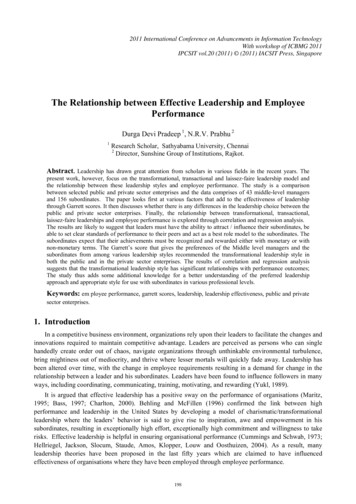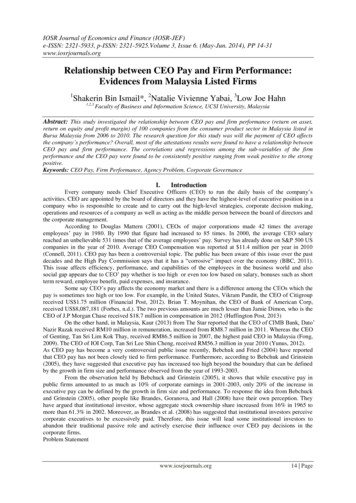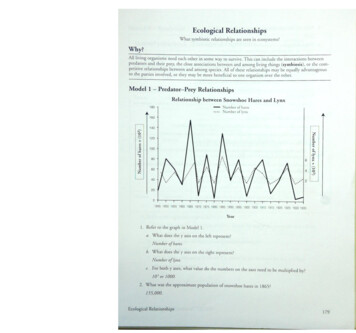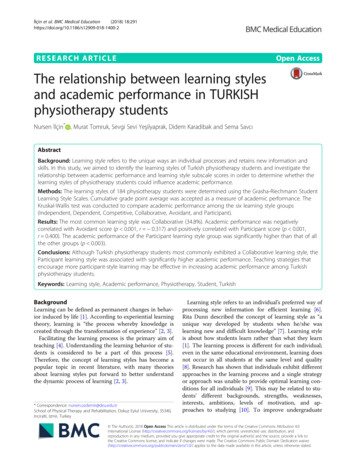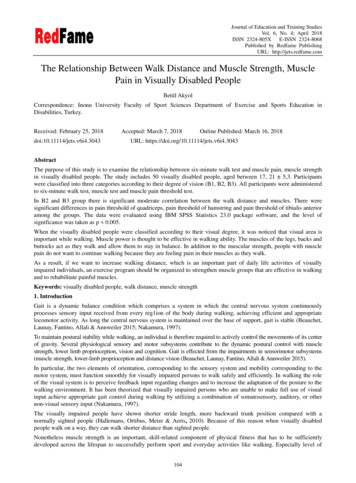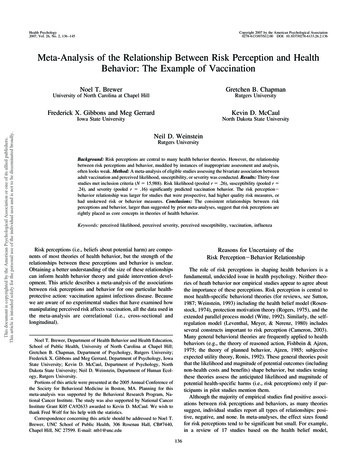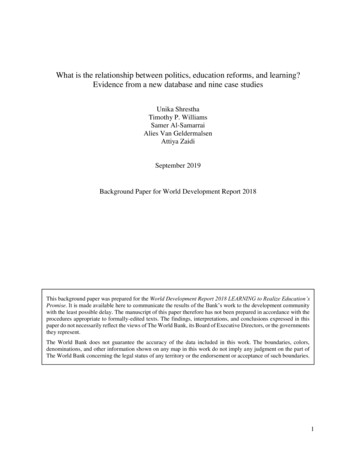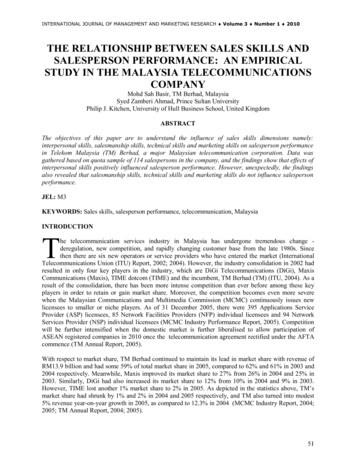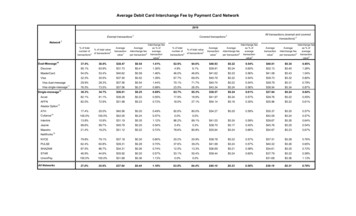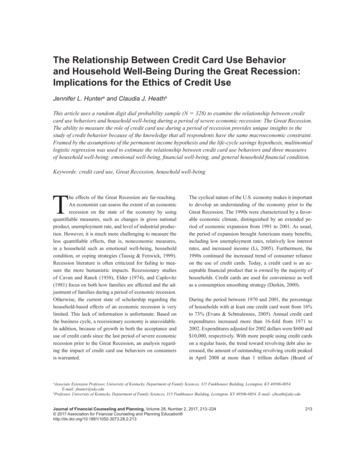
Transcription
The Relationship Between Credit Card Use Behaviorand Household Well-Being During the Great Recession:Implications for the Ethics of Credit UseJennifer L. Huntera and Claudia J. HeathbThis article uses a random digit dial probability sample (N 5 328) to examine the relationship between creditcard use behaviors and household well-being during a period of severe economic recession: The Great Recession.The ability to measure the role of credit card use during a period of recession provides unique insights to thestudy of credit behavior because of the knowledge that all respondents have the same macroeconomic constraint.Framed by the assumptions of the permanent income hypothesis and the life-cycle savings hypothesis, multinomiallogistic regression was used to estimate the relationship between credit card use behaviors and three measuresof household well-being: emotional well-being, financial well-being, and general household financial condition.Keywords: credit card use, Great Recession, household well-beingThe effects of the Great Recession are far-reaching.An economist can assess the extent of an economicrecession on the state of the economy by usingquantifiable measures, such as changes in gross nationalproduct, unemployment rate, and level of industrial production. However, it is much more challenging to measure theless quantifiable effects, that is, noneconomic measures,in a household such as emotional well-being, householdcondition, or coping strategies (Tausig & Fenwick, 1999).Recession literature is often criticized for failing to measure the more humanistic impacts. Recessionary studiesof Cavan and Ranck (1938), Elder (1974), and Caplovitz(1981) focus on both how families are affected and the adjustment of families during a period of economic recession.Otherwise, the current state of scholarship regarding thehousehold-based effects of an economic recession is verylimited. This lack of information is unfortunate. Based onthe business cycle, a recessionary economy is unavoidable.In addition, because of growth in both the acceptance anduse of credit cards since the last period of severe economicrecession prior to the Great Recession, an analysis regarding the impact of credit card use behaviors on consumersis warranted.The cyclical nature of the U.S. economy makes it importantto develop an understanding of the economy prior to theGreat Recession. The 1990s were characterized by a favorable economic climate, distinguished by an extended period of economic expansion from 1991 to 2001. As usual,the period of expansion brought Americans many benefits,including low unemployment rates, relatively low interestrates, and increased income (Li, 2005). Furthermore, the1990s continued the increased trend of consumer relianceon the use of credit cards. Today, a credit card is an acceptable financial product that is owned by the majority ofhouseholds. Credit cards are used for convenience as wellas a consumption smoothing strategy (Durkin, 2000).During the period between 1970 and 2001, the percentageof households with at least one credit card went from 16%to 73% (Evans & Schmalensee, 2005). Annual credit cardexpenditures increased more than 16-fold from 1971 to2002. Expenditures adjusted for 2002 dollars were 600 and 10,000, respectively. With more people using credit cardson a regular basis, the trend toward revolving debt also increased, the amount of outstanding revolving credit peakedin April 2008 at more than 1 trillion dollars (Board ofAssociate Extension Professor, University of Kentucky, Department of Family Sciences, 315 Funkhouser Building, Lexington, KY 40506-0054.E-mail: jhunter@uky.edubProfessor, University of Kentucky, Department of Family Sciences, 315 Funkhouser Building, Lexington, KY 40506-0054. E-mail: cjheath@uky.eduaJournal of Financial Counseling and Planning, Volume 28, Number 2, 2017, 213–224 2017 Association for Financial Counseling and Planning Education -2 Final A5 213-224.indd 21321310/10/17 8:03 AM
Governors of the Federal Reserve System, 2017). Duringthe time leading up to the Great Recession, 46% of familiescarried a monthly balance, with the mean balance for thosehouseholds carrying a credit card balance in 2007 at 7,300(Bucks, Kennickell, Mach, & Moore, 2009). American’sreliance on consumer credit as a consumption smoothingtool has the potential of placing the household in a morevulnerable position during a period of economic shock.Chalise and Anong (2017) identified that families spendingin excess of their income were more likely to be in financialdistress. Similiarly, high credit card debt loads have beenlinked with lower levels of subjective well-being (Bell et al.,2014). During the Great Recession and economic recoverythat followed, revolving credit amounts fell for an extendedperiod before rebounding (Canner & Elliehausen, 2013).In addition, since 1970, technological change combinedwith business and consumer adaptation to changes in creditcard use have positioned credit card use not only as convenient but also necessary for many types of transactions.Although there may be some substitutes for credit card use,such as PayPal, credit cards provide additional online consumer protections that encourage their use. Likewise, rewards tied to credit card use further promote and encouragetheir proliferation and use (Canner & Elliehausen, 2013).The purpose of this study is to examine the relationship between credit card use behaviors and household well-beingduring the Great Recession. This research will add to thecurrent void that exists in scholarly literature concerninghousehold economic activities during a period of economicrecession. Furthermore, the study provides a unique perspective on recessionary studies because the data was collectedduring the recessionary event as opposed to retrospectively.Theoretical PerspectivesEconomic theories can be used to explain consumer behaviorconcerning spending decisions as well as to provide insightsto the ethical dilemma associated with debt accumulation.The permanent income hypothesis, as well as the life-cyclesavings hypothesis, posits that consumer spending and saving decisions are made based on the prospect of a higherfuture income and a long-term horizon to repay debt (Ando& Modigliani, 1963; Friedman, 1957; Modigliani, 1966).Arguments may be made that these hypotheses only explainsaving and spending decisions while people are young.In addition, it has been suggested that the permanent income214JFCP28-2 Final A5 213-224.indd 214hypothesis does not address the estimated amount of futureincome changing over time and neglects the considerationof current income (Katona, 1968).The life-cycle savings framework suggests that householdswill use credit to finance consumption today because theythink they will be able to repay the debt with future income.The life-cycle model focuses on consumers maximizingtheir utility through a series of spending and saving decisions spread over a lifetime. Therefore, time preference aswell as age and family composition will play a large rolein the financial decision process and willingness to usecredit as a means of consumption (Dilip & Cheema, 2002;Dunkelberg & Stafford, 1971; Kim & DeVaney, 2001).Economic recession represents a disturbance in manyhousehold consumption models. Many households approached the most recent economic recession (December2007–June 2009) as a shock rather than a natural declinein the economic cycle (Mian, Rao, & Sufi, 2013), therebysuggesting households would not have curbed consumptionor paid down credit card debt in anticipation of the declining economy. This article will determine the relationshipbetween credit card use behavior and household well-beingduring the most recent period of extended economic recession commonly referred to as the Great Recession. The factors influencing consumption including age, marital status,number of children, education, and income were considered.Research Questions and HypothesesThe goal of this research is to address the question: Whatis the relationship between credit card use behavior andthree measures of household well-being during the GreatRecession? Ultimately, given these results, what are the implications for the ethics of credit use?The overall hypothesis of this research study is that duringthe period of a severe economic recession, households thathave exhibited risky credit use behaviors will experience reduced levels of emotional and financial well-being as wellas a low level of general household financial condition. Alist of specific directional hypotheses is presented in Table 1.Directional hypotheses for the independent and controlvariables of interest are consistent with life-cycle andpermanent income hypotheses and the overall hypothesisof this study. Demographic measures of socioeconomicJournal of Financial Counseling and Planning, Volume 28, Number 2, 201710/10/17 8:03 AM
TABLE 1. Summary of HypothesesVariablesEmotional Well-BeingFinancial Well-BeingFinancial ConditionDemographics fundAge111Marital r of credit cards222Carry credit card balance222Credit reasonsNecessities2222/12/12/1Liquidity111Credit usesNecessitiesFuture income222Convenience111Items can’t afford222Emergency111Pay day loan222Fuel pay222Grocery pay222Written budget111Mental budget111Emergency fund111Note. 1 5 expect positive correlation; 2 5 expect negative correlation; 2/1 5 expect uncertain correlation.status—age, marital status, education, and income—arehypothesized to be positively correlated with emotionaland financial well-being as well as a financial condition,whereas the relationships between gender and well-beingand gender and financial condition are uncertain. Specificto this study, hypotheses regarding credit card use behaviorand the three dependent variables—emotional well-being,financial well-being, and financial condition—are consistent across the three dependent variables. Number of activecredit cards and consistently maintaining a credit card balance are hypothesized to be negatively associated with wellbeing and financial condition. Reasons for the use of creditcards for necessities, to buy items that cannot otherwise beafforded, and to pay for fuel and groceries are negatively related to well-being and financial condition, whereas the useof credit cards for liquidity purposes is positively related tothese same measures. Last, having a written or mental budget and use of credit cards for emergency fund purposes arehypothesized to be positively correlated with emotional andfinancial well-being as well as financial condition.MethodsProcedureThis study was conducted to determine the relationshipbetween credit card use behaviors and the well-being ofhouseholds located within Kentucky, during the Great Recession. A probability sample was collected in late 2008,using random digit dialing, to give every household inthe state an equal probability to be included in the study.The Family Science Survey Research Center, located at theJournal of Financial Counseling and Planning, Volume 28, Number 2, 2017JFCP28-2 Final A5 213-224.indd 21521510/10/17 8:03 AM
University of Kentucky, was used to conduct the survey.The survey instrument consisted of 116 questions. Surveyquestions included a mix of closed-ended and open-endedresponses.The telephone survey was conducted from November 13,2008, to December 20, 2008. This period immediately followed the 2008 United States presidential election, coincided with the official announcement of the recession bythe National Bureau of Economic Research, and markedthe 12th month of the recession (National Bureau of Economic Research, 2008). Calls were made in the eveningsMonday through Friday from 5:00 pm to 9:00 pm and onSaturdays from 11:00 am to 3:00 pm to maximize the potential of a respondent being available to complete the survey.WinQuery interviewing software was used to assist in thedata collection. Each residential working telephone numberhad a maximum of 12 attempts prior to being removed fromthe number database. All participants were a minimum of18 years of age or older.Variable SelectionTable 2 identifies all retained variables and response categories. Variables which were retained in one or more ofthe analyses included carrying credit card balance, severalcredit cards, the primary reason for using a credit card,description of credit card use, maintaining an emergencyfund, and having a written or mental budget. Although theinclusion of financially responsible behaviors (maintainingan emergency fund and having a written or mental budget)may appear counterintuitive to understand the impact ofcredit card use behaviors on well-being during a recessionary period. The literature identified both liquidity preference and the conscious decision to use credit for ease oftransactions or to improve one’s credit score as reasons touse credit.A series of simple regressions were run to test the identified factors influencing consumption, including age, maritalstatus, the number of children in the household, education,and income. A forward multinomial logistic regression wasconducted to determine which independent variables (age,gender, education, income category, number of credit cards,primary reason for credit cards, use of credit cards, fuelpay, groceries pay, use payday loan service, education, income category, emergency fund, written budget, and mentalbudget) were predictors for each well-being measure.216JFCP28-2 Final A5 213-224.indd 216Based on the nature of the research question, the analysiswas exploratory, using the forward stepping option, whichresulted in only the independent variables that were statistically related to the dependent variable being retained.The forward-stepping approach results in a different set ofretained independent variables for each outcome variableof interest.Outcome Variables of InterestEmotional Well-Being. The depe
ing the impact of credit card use behaviors on consumers is warranted. JFCP28-2_Final_A5_213-224.indd 213 10/10/17 8:03 AM. 214 Journal of Financial Counseling and Planning, Volume 28, Number 2, 2017 Governors of the Federal Reserve System, 2017). During the time leading up to the Great Recession, 46% of families carried a monthly balance, with the mean balance for those households


